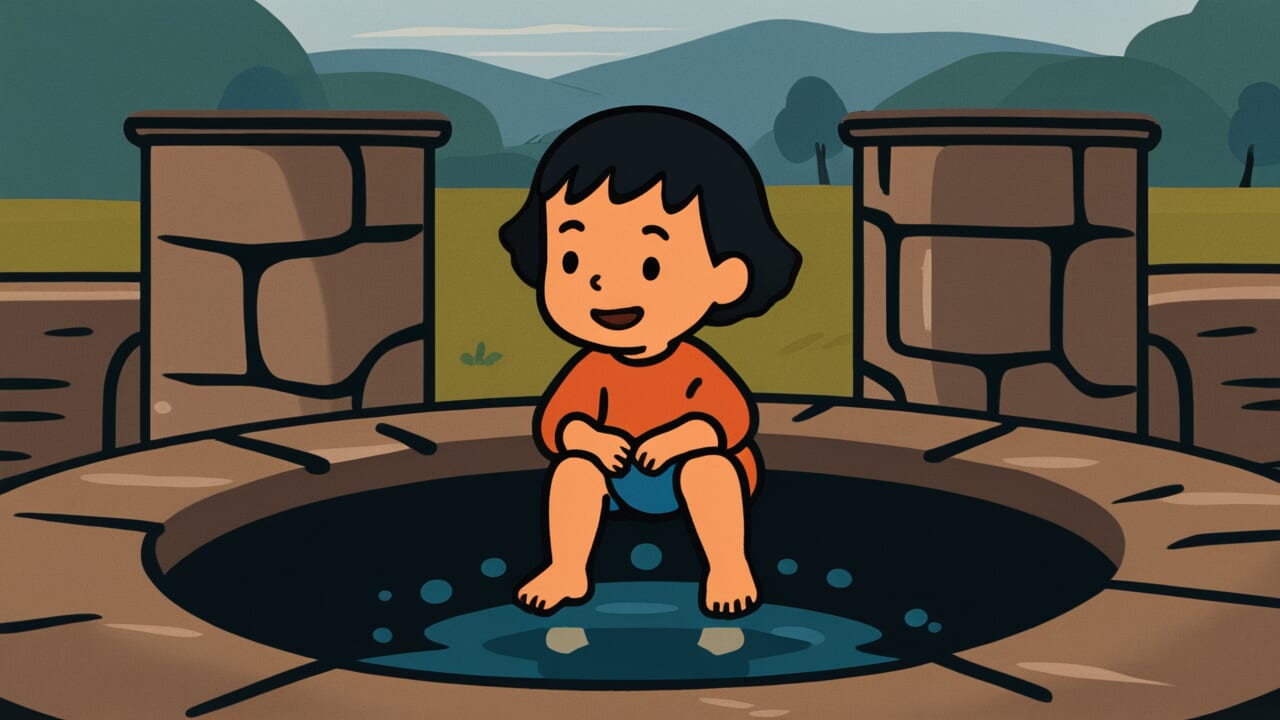How to Read “A child at the edge of a well”
Ido no hata no warawa
Meaning of “A child at the edge of a well”
“A child at the edge of a well” is a proverb that warns against dangerous behavior, like a child playing at the edge of a well.
Wells are deep, and falling into one could be fatal. Yet young children don’t understand this danger and approach out of curiosity.
This proverb warns people who act recklessly, either while aware of danger or without fully understanding it.
It’s especially used when someone feels casual about a situation that others see as very dangerous.
Even today, this expression works well for warning against actions that underestimate risk or approach danger out of mere curiosity.
Through the concrete image of a child’s innocence, it vividly portrays being unaware of danger.
Origin and Etymology
The exact first appearance of this proverb in literature is unclear. However, we can understand how it formed by looking at its components.
“Edge of a well” refers to the rim or area around a well. Wells were once essential for getting water for daily life.
At the same time, they were dangerous places—deep holes. For children especially, wells sparked curiosity while being places where one wrong step could cost a life.
“Warawa” is an old word meaning child, often referring to young children specifically.
Young children lack sufficient awareness of danger. They tend to act on their interests without thinking.
This proverb expresses a warning against reckless behavior through the image of a child innocently playing at the well’s edge.
By using the concrete, familiar danger of a well, it cleverly makes the abstract concept of “dangerous actions” easy to understand.
In traditional Japanese living spaces, wells symbolized danger existing alongside daily life.
Just as parents repeatedly taught children “don’t go near the well,” this proverb was likely passed down among people as a warning about danger.
Usage Examples
- Jumping into that investment scheme is like being a child at the edge of a well
- He charges forward ignoring danger, which is no different from a child at the edge of a well
Universal Wisdom
The proverb “A child at the edge of a well” shows deep insight into human nature.
It reveals the truth that we can’t always act rationally when facing danger.
Children play at the well’s edge not from malice or recklessness. Their immediate interest simply outweighs their awareness of danger.
Isn’t this a universal human weakness that applies to adults too?
Even when we know danger intellectually, we sometimes step into dangerous territory. We’re driven by desire, curiosity, or the baseless confidence that “I’ll be fine.”
This proverb has been passed down for so long because our ancestors keenly understood this human tendency.
Danger is always close to us. Sometimes it takes visible forms like wells, and sometimes it exists invisibly.
Yet this proverb also contains warmth. By calling those who approach danger “children,” it doesn’t completely reject their actions.
Instead, it tries to understand them as mistakes born from immaturity.
Anyone can become “a child at the edge of a well” at some point in life.
That’s why this proverb teaches us the importance of watching over and warning each other.
When AI Hears This
Two cognitive errors work simultaneously in the psychology of children playing at the well’s edge.
The first is “normalcy bias.” The human brain tends to judge “it’s still okay” even in dangerous situations.
Disaster research shows that about 70% of people who don’t evacuate despite tsunami warnings are affected by this bias.
Children at the well’s edge unconsciously judge “this time will be fine too” based on not having fallen before.
Even more interesting is the psychology when multiple people play together.
Psychology experiments show that as the number of people witnessing an emergency increases, each person’s action rate decreases.
With five people present, the probability of helping becomes about one-fifth compared to being alone.
In other words, the more children at the well’s edge, the less likely anyone is to say “let’s stop, this is dangerous.”
When these two combine, it becomes frightening. People believe they won’t fall and expect someone else to stop them.
As a result, the entire group moves toward danger.
In modern corporate scandals, cases where many employees notice problems but no one speaks up follow exactly this structure.
More people should mean more safety, but psychological mechanisms work in reverse.
Ancient people expressed this paradox through the everyday scene of a well.
Lessons for Today
This proverb teaches us the importance of viewing our own actions objectively.
Any of us can be standing at “the edge of a well” without realizing it.
Danger has become especially hard to see in modern society.
Careless comments on social media, easy borrowing, lifestyles that ignore health—these aren’t deep holes like wells.
But by the time you notice, you might be in an irreversible situation.
What matters is listening to the words of people around you.
If someone worries about something you think is “fine,” it’s worth stopping to think about it.
That’s not cowardice—it’s a wise choice.
At the same time, this proverb teaches us kindness.
When you see someone taking dangerous actions, don’t blame them. Instead, understand it as a mistake from immaturity, like “a child at the edge of a well.”
By having such a compassionate heart, we can build a better society.



Comments